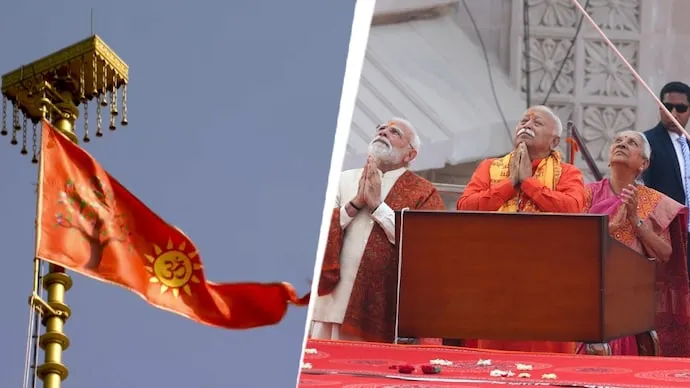India Rebuts Pakistan's Criticism of Ram Temple Flag Hoisting

India's Ministry of External Affairs (MEA) has strongly countered remarks made by Pakistan regarding the recent flag hoisting at the Ram Temple in Ayodhya. MEA spokesperson Randhir Jaiswal asserted that Pakistan lacks the moral authority to comment on India's internal affairs, given its history of discrimination against minorities.
During a weekly press briefing, Jaiswal stated, "We have seen the reported remarks and reject them with the contempt they deserve. As a country with a deeply stained record of bigotry, repression, and systemic mistreatment of its minorities, Pakistan has no moral standing to lecture others." He emphasised that Pakistan should focus on its own human rights issues rather than making hypocritical statements.
The comments from the MEA followed an official statement from Pakistan's Ministry of Foreign Affairs, which condemned the flag hoisting ceremony as an act of "Islamophobia" and a violation of cultural heritage. This statement referenced the controversial demolition of the Babri Masjid in 1992, a significant event that continues to fuel tensions between the two nations.
Prime Minister Narendra Modi participated in the Dhwajarohan Utsav on November 25, where he ceremonially hoisted a saffron flag atop the newly constructed Shri Ram Janmabhoomi Temple. This event marked a pivotal moment in the temple's history, symbolising its completion and significance in Hindu culture. Modi described the ceremony as a deeply moving experience, stating that the flag serves as a reminder to uphold commitments, even at great personal cost.
Jaiswal's remarks highlighted the contrast between India's celebration of religious identity and Pakistan's criticism. He called for Pakistan to look inward and address its own human rights challenges instead of casting aspersions on India. The MEA's response illustrates ongoing tensions between the two countries, particularly surrounding issues of religious freedom and minority rights.
In its statement, Pakistan urged the international community to take notice of what it described as increasing pressure on religious minorities in India. It called upon the Indian government to respect the rights of these communities. However, India's government firmly rejected Pakistan's assertions, labelling them as hypocritical and an example of Islamabad's own failures regarding human rights.
The exchange of statements comes amidst heightened scrutiny of both nations' human rights records, with India asserting its commitment to secularism and minority welfare, while Pakistan continues to focus on its narrative regarding the treatment of Muslims in India. This episode underscores the complex and often contentious relationship between the two neighbouring countries, particularly in matters of religion and cultural identity.

Tata Sierra 2025 Launch: A Blend of Luxury and Performance

India's Cabinet Approves Rs 7,200 Crore Scheme for Rare Earth Magnets

HP Plans Job Cuts Amid Tech Sector Restructuring

Nuvama Research Gives Premier Energies 'Buy' Rating with Target of Rs 1,270





